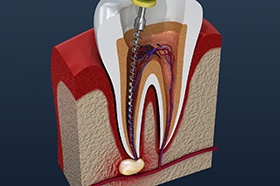Root Canal Therapy – Marshall, TX
Relieving Your Pain and Improving Your Oral Health

A toothache can create some of the most intense and distracting pain imaginable. Fortunately, Dr. Parker and our team are here to help you find relief. After we examine you, we may determine that you could benefit from root canal therapy. This advanced service can end your pain, save your tooth from extraction, and contribute to improved oral health. Read on below to learn more about this remarkable treatment.
Why Choose Marshall Denture Clinic for Root Canal Therapy?
- Dentist with Decades of Experience
- Sedation Available
- Potentially Prevent an Extraction
Do I Need Root Canal Therapy?

The root canal is the area in a tooth’s root that contains its pulp (a soft substance that houses nerves, blood vessels, and connective tissues). When damage or infection affects the pulp, it may be necessary to perform root canal therapy.
Here are a few signs that you might benefit from this treatment:
- You have a throbbing, extremely painful toothache.
- A tooth is darker than the ones around it.
- You have a pimple-like bump on your gums.
- There is visible damage to a tooth.
In some cases, root canal therapy is necessary even when no pain is present. This may be the case if the nerve inside the tooth has died.
The Root Canal Process

First, our team takes steps to ensure patient comfort. We will numb the tooth and, if necessary, administer sedation. Once we begin working, you should feel little to nothing, aside from a bit of pressure.
To treat the tooth, we use special tools to access its pulp. Then, we clean out the damaged and infected tissues. This includes removing the tooth’s nerve. Next, we fill in the tooth with an inert material known as gutta percha to help it maintain its structure.
In most cases, a tooth that has undergone root canal therapy should receive a crown to help it function as optimally as possible.
The Benefits of Getting a Root Canal

Some of the top potential benefits of allowing your dentist to perform root canal therapy include:
- Comfortable treatment. In the past, root canal therapy was largely regarded as a painful treatment. Today, though, many patients remark that it feels like getting a small filling.
- Prevent an extraction. This can spare you from a gap in your smile and save you money because you won’t have to pay for tooth replacement later on.
- Reliable results. Most root canals are successful and provide a lifetime of pain-free function for the treated tooth.
- Dr. Parker can place a lifelike metal-free crown on the tooth so no one will know it ever had a problem.
Understanding the Cost of Root Canals

At our office, we understand that cost is a major concern for most patients. Unfortunately, the pricing for root canals isn’t exactly the same for everyone because each patient’s case is unique. If you are concerned about paying for root canal treatment, don’t hesitate to talk to us. Just remember that the longer you don’t act and address the problem, the worse it will get—and the more it’ll cost to fix.
Factors That Can Affect Root Canal Cost

When we calculate the cost, we consider multiple factors, including the severity of the decay, how long it takes to perform root canal therapy, and what kind of restoration is required. For example, a more minor root canal will cost less than a complex case, and a filling will cost less than a crown. Before we begin the procedure, our team can explain the financial details of your case so you have a clearer idea of what we’ll do and how much it will cost.
Is it Cheaper to Pull My Tooth?

In dentistry, usually the less invasive the treatment is, the lower the cost. At first glance, it may seem simpler and more affordable to have the tooth removed entirely rather than to have a root canal, and in some situations removal may cost less in the short term. However, you must also consider the cost of replacing the tooth after extraction. High-quality implants, bridges, and dentures do not come cheap, making root canal therapy the more cost-effective treatment option.
Does Dental Insurance Cover Root Canal Therapy?

Overall, dental insurance does generally include root canal benefits. However, it’s a good idea to double check with your insurance provider first. Most of the time, about half of the cost is paid for by insurance, which means you’ll be responsible for the other half out-of-pocket. The same coverage goes for the restoration, most likely a crown, that covers the treated tooth after root canal therapy. If you have questions regarding your dental insurance, our team will be happy to help however we can.
Other Options for Making Root Canal Therapy Affordable

Money shouldn’t stand between you and a healthy, strong smile. Whether you have dental insurance or not, paying for treatment may stretch your budget, which is why you should talk to our team about your financing options. We are willing to work with you and find a payment method that helps everyone walk away satisfied. With us, you can focus on getting well again and not on the financial details of your treatment.
Root Canal FAQs

If you aren’t familiar with root canal therapy, you may have certain questions about the procedure. We invite you to ask Dr. Parker in person if you need clarification, but we have answered a handful of common questions on this page for your convenience. Please take a look at our responses, and let us know if you would like to discuss root canals in greater detail. We want you to feel confident about your treatment and your smile!
How Long Does Root Canal Therapy Take?
Root canal therapy typically requires between 30 and 90 minutes to complete, depending on multiple factors. The extent of the damage as well as the tooth’s location play a role in determining how long your appointment will be, and we do our best to finish treatment in one visit (with a second visit for bonding your custom crown in place). When he diagnoses your case, Dr. Parker should be able to give you a more precise timeline and let you know what to expect.
How Does Sedation Help During Root Canal Therapy?
In many cases, we recommend oral conscious sedation for root canal patients. This prescribed pill, taken before the appointment, helps you relax and feel comfortable throughout the procedure, allowing Dr. Parker to work as efficiently as possible. Oral conscious sedation does not “put you to sleep,” but it comes with an amnesiac effect, meaning you may not remember details from your visit. In other words, sedation can make your root canal experience better!
How Long Is the Recovery After a Root Canal?
For many patients who undergo root canal therapy, they are able to return to normal activities the following day. However, if you have a physically demanding job, you may need an extra day to fully recover. Keep in mind that, once the local anesthetic wears off, you may feel a little bit of soreness or sensitivity. It shouldn’t last more than a few days, and over-the-counter pain medicine should provide enough relief to manage this discomfort.
How Long Do Root Canals Last?
A tooth that has had root canal therapy can go for many years—a lifetime even—without becoming reinfected. It all depends on how well the treated tooth is maintained through brushing, flossing, and regular visits to Dr. Parker. While a temporary crown is over the tooth, it is more vulnerable to reinfection because of the loose fit, so you need to be diligent during the weeks that your custom crown is being fabricated.
 Request A Free Consultation
Request A Free Consultation
